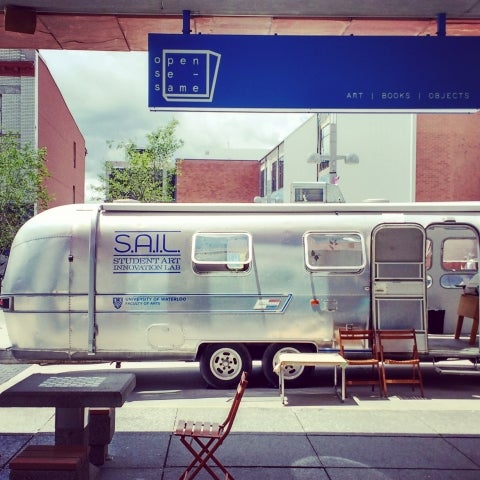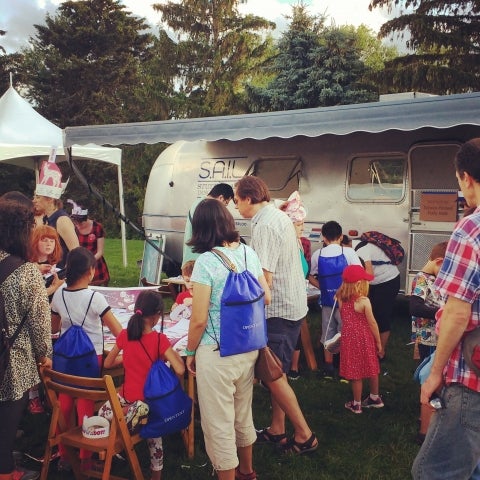Imagine walking through your local park, and there amidst the tranquil setting you notice a vintage silver Airstream trailer parked beside the trail. Eyebrow arched, you wonder what your next-door neighbours’ kid is doing with the gathering group at the Airstream? Strolling closer, you discover that it is a free drop-in program, and anyone can participate. Curiosity piqued, you decide to join in. Perhaps you were not planning to spend an hour making funky bicycle flags with people you may or may not know, but something magical happens because you do. Making art, you quickly realize, can be a profoundly meaningful experience, changing your relationship with your neighbourhood, and connecting with your creative side.
SAIL (Student Art Innovation Lab) is a pop-up art program that activates culture by making creative arts accessible and fun for everyone. Designed and delivered by University of Waterloo students from Fine Arts and Theatre & Performance, SAIL offers programming for people of all ages and skill-levels. Activities are developed and facilitated by the students, based on their areas of expertise. SAIL's offerings include exquisite corpse relief-cut printing, mask-making, stop-motion animation, poetic pennants for your bicycle, silkscreen printed animal hats, musical instrument making workshop, botanical collages from your own backyard, plus a DIY vinyl sign-making workshop.
Launched early this summer, SAIL partners with local organizations to deliver high-quality art experiences to their patrons. “SAIL has a materiality to it as well as a really rigorous approach to meaning and making,” says Professor Tara Cooper, SAIL Faculty champion. “We’re connecting with people on their own turf, and animating the creative experience so that it’s meaningful for them.”
SAIL is inclusive, accessible, and available at no cost to patrons thanks to the generous support of donors, community partners, and corporate sponsors. In addition to collaborating with professional artists, participants learn how art can open up creative expression or help them respond to and understand the world around them. It builds skills in young artists, giving them confidence to explore their creativity, or follow their dream of becoming a professional artist. It enriches the community by offering more ways for them to engage in and appreciate contemporary art.
SAIL is also a dream job for the students who design the program from scratch. It gives them first-hand experience running an arts-based community outreach program. “It allows us to expand our own potential,” says Denise, one of three students hired to run SAIL. “It’s empowering to be put in charge of a budget, and to design content that I’m excited about,” adds Jess.
The students are encouraged to experiment with their ideas. “If something doesn’t work, the students get immediate feedback,” says Professor Cooper. “They can tweak things and make modifications in real time. True innovation happens when you can take creative risks and test ideas. You get better results with this type of creative freedom.”
 Arts and culture plays an important role in building a strong sense of belonging to community, and improves the quality of life for residents. Many factors contribute to Waterloo Region’s innovation ecosystem, including a vibrant arts and culture scene. The Fine Arts department at the University of Waterloo is a pillar for the creative sector, with most of its faculty members maintaining professional practices alongside their academic positions. They contribute to the cultural economy by making their own art, and volunteering with local arts organizations. SAIL provides another opportunity for UW faculty and students to engage with community. It’s a win-win for everyone.
Arts and culture plays an important role in building a strong sense of belonging to community, and improves the quality of life for residents. Many factors contribute to Waterloo Region’s innovation ecosystem, including a vibrant arts and culture scene. The Fine Arts department at the University of Waterloo is a pillar for the creative sector, with most of its faculty members maintaining professional practices alongside their academic positions. They contribute to the cultural economy by making their own art, and volunteering with local arts organizations. SAIL provides another opportunity for UW faculty and students to engage with community. It’s a win-win for everyone.
To help students reach their full potential, the Faculty of Arts recently launched the Arts 360 Fund to provide more students with experiential learning opportunities like SAIL.
For more information about the Arts 360 Fund, the SAIL program, or to make a contribution, please contact Nancy Mattes, Associate Director Arts Advancement at 519-888-4567, ext. 38213 or nancy.mattes@uwaterloo.ca
Waterloo Arts sincerely thanks its donors and community partners for their generous support of the Student Art Innovation Lab: Chalmers Family Arts and Culture Experience Award | The Kitchener and Waterloo Community Foundation | The Musagetes Fund












